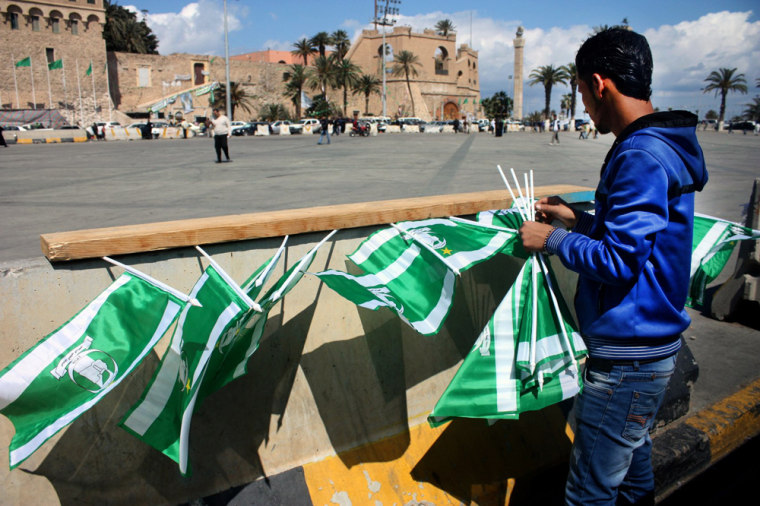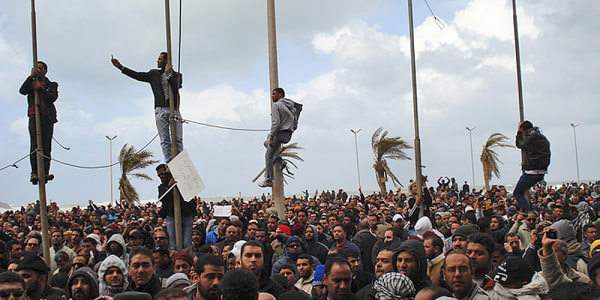In Tripoli's Green Square, volunteers hand out the green flag, symbol of Libya since Moammar Gadhafi's 1969 coup, and a giant picture of the "brother leader" looks down on the palm-lined streets.
But in other neighbourhoods, dissidents come out in the dead of night and leave the red, green and black rebel flag unfurled in the streets, residents and opposition activists say.
Opposition graffiti appears overnight, they say, only to be painted over in the morning or replaced with the pro-government slogan "God, Muammar, Libya and that's all."
With the uprising now in its third month, Tripoli remains under Gadhafi's control and he can count on a certain amount of popular support. But tension is simmering beneath the surface.
"Things are tense. They are not normal. I think something will explode soon. There are rumblings at night. You hear gunfire and it is not always celebratory," said one Tripoli resident. "In some neighbourhoods, people wake up and find the rebel flag. It is just a sign, just to say 'we are here'."
It is difficult for foreign correspondents to venture out without government minders to check what is behind the occasional bursts of gunfire heard overnight.
Ten days ago, small arms fire and anti-aircraft guns rattled for over two hours outside the hotel where foreign journalists are staying. Gadhafi supporters said they were celebrating the rumoured death of a rebel leader.
In a sign of growing concern that sanctions and NATO strikes could cripple Gadhafi's military efforts, text messages were sent to Libyan mobile phones in the following days, urging Libyans to save their ammunition for "the crusader enemy".
"The situation across the whole coast, from Misrata to Tripoli is tense. It is ready to blow," the resident said.
Fearing Gadhafi's plainclothes security and chastened by his crackdown on protests in February and March, Tripoli residents are afraid to speak, making it hard to gauge the public mood.
In the winding alleys of Tripoli's old souk, few shopkeepers agreed to speak. Asked how business was, one man said: "Fine" and turned back to his television set. Another made a gesture with his hand showing the situation was rocky.
Slideshow 81 photos
Libya's uprising against Gadhafi
In the pro-Gadhafi neighbourhood of Abu Salim, a jeweller's face visibly blanched, sweat appearing on his brow, when he was approached by journalists with government minders looking on.
But snatches of conversation overheard among stacks of traditional clothes and cloth caps displayed in the old souk, suggest politics is on people's mind.
"How are you going to get into Misrata," one shopkeeper asked a friend, before he noticed passers-by and fell silent.
Elsewhere in Tripoli, a shopkeeper, who declined to give his name, said Gadhafi and his sons should all go.
"This man needs to go. After 41 years, he still wants to hand Libya over to his son. Is there no one else in this country?" he said, changing the subject when customers came in.
"Look what he is doing in Misrata, attacking the people. He wiped out Zawiyah and for what? So he can hand it to his son?."
Fighting has raged in Misrata for weeks now, but government forces have put down a rebellion in Zawiyah, west of Tripoli.
Petrol and propaganda
In the petrol queues that wind around corners and block streets, scuffles are breaking out and frustration is rising as civilians wait overnight, in some cases for days, to fill up.
Sanctions have made it much more difficult for Gadhafi's government to importi gasoline, and it is largely relying on one 120,000-litre-a-day refinery in Zawiyah to serve the government-controlled west.
The dinar has lost value, pushing up the prices of some imported food and consumer goods on which Libya depends.
The mood differs over neighbourhoods.
In areas like Tajoura or Fashloom, the focal points of protests that shook the capital early on, streets are covered in green flags and crawling with informers, but there is tension.
The Tripoli resident said small numbers of youths come out at night and the discontent is spreading to other areas such as the upscale neighbourhood of Gergaresh.
With the internet switched off, young activists are finding it hard to organise and people are too scared to come out due to what many believe has been a spate of detentions.
In the pro-Gadhafi working class area of Abu Salim, music stalls blare songs released to back Gadhafi and taunt dissidents he has vowed to weed out "zenga zenga" or "alley by alley".
Outside the national museum, set in a seafront fortress, a group of volunteers collect fingerprints of people who pledge support for Gadhafi and denounce NATO intervention in Libya.
Speaking outside a meeting of pro-Gadhafi tribes in Aziziyah, 60 km (40 miles) outside Tripoli on Saturday, Nasreddine Abou Amaid praised Gadhafi for handing out 500 dinars a month: "People who don't work get a salary. Hospitals are free. Bread is so cheap we feed it to the chickens and sheep."
That view was echoed by a taxi driver, who had a green flag on his dashboard and said he volunteered as an ambulance driver by night: "These people against Gadhafi are animals. If you have lived in peace and stability for years, why would you change that? We don't even close our doors at night."
Mistrust
But those views are not universal.
A driver, who gave his name as Ahmed, said Libya was not run on merit but on connections. Those close to the Gadhafis benefitted. Others suffered, despite Libya's vast oil wealth.
"You hear about Libya and you imagine it to be different to this, an oil country, but I would not be working as a driver if we were rich," he said. "Libya is rich. People are poor."
Mistrust of the Gadhafi government runs so deep amongst some, that the shopkeeper said he did not believe government reports that Gadhafi's son Saif al-Arab and three grandchildren were killed in a NATO airstrike on Saturday.
It was a ruse, he said, to force NATO to stop its attacks and to elicit public sympathy. "No one is with him except the few people who are benefitting," he said, adding that people were simply afraid to speak out. "In Tripoli, if you say anything you are disappeared andd no one knows what happened to you."
Still, At Saif's funeral on Monday, crowds chanted support for Gadhafi and vowed revenge for the attack.
"We are all with Gadhafi's Libya," read one placard.

